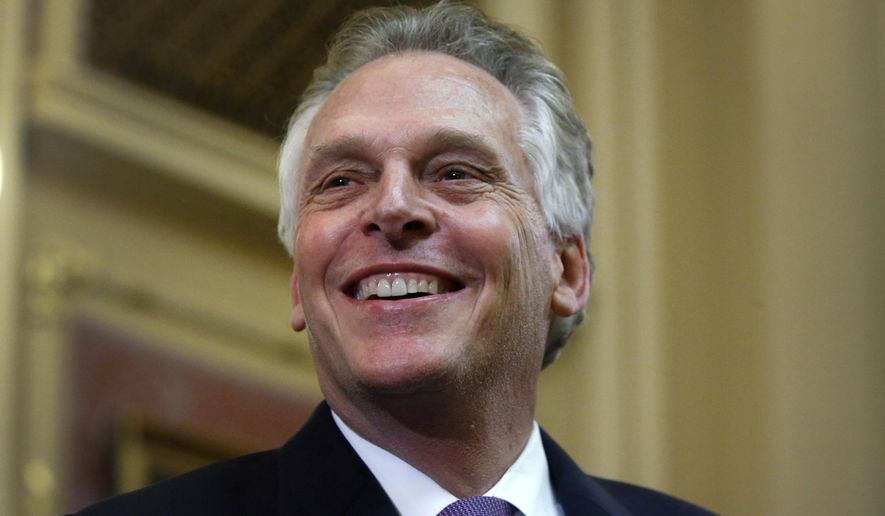RICHMOND, Va. (AP) - Virginia Gov. Terry McAuliffe, once best known as a top Democratic money man and close friend of Bill and Hillary Clinton, reinvented his image during a largely successful four-year term that saw him tirelessly market the state, make major transportation deals and restore more voting rights than any other governor in the country.
The fundraiser-turned-administrator, who leaves office on Saturday when his four-year term is up, is frequently mentioned as a potential 2020 presidential contender. He stepped into the national spotlight as a leading liberal voice on certain social issues, winning kudos for undoing a vestige of the state’s Jim Crow era and restoring voting and other civil rights to felons who have completed their sentences. McAuliffe’s blunt criticism of the white nationalists who sparked a deadly rally in Charlottesville last summer also drew a sharp contrast with President Donald Trump’s shaky response.
McAuliffe helped Hillary Clinton win Virginia in the last presidential election - the only southern state she won.
The governor’s record has plenty of smudges. He failed to get his top legislative priority - Medicaid expansion - passed, and it’s still too early to judge his effectiveness at creating jobs and diversifying the state’s economy.
Here’s some notable issues that shaped McAuliffe’s time in office:
RIGHTS RESTORATION
McAuliffe tried to restore voting and other civil rights to more than 200,000 felons in one fell swoop with an executive order last April, but Republicans successfully challenged him in the state Supreme Court.
It was only a temporary setback, as McAuliffe quickly signed restoration orders on an individual basis rather than en masse. So far, McAuliffe has restored voting rights for about 170,000 felons. He has often said it is one of his proudest legacies as governor.
ECONOMIC DEVELOPMENT
Central to McAuliffe’s legacy is his work to create a “New Virginia Economy” that is less dependent on federal government spending.
The governor’s relentless marketing of Virginia as a good place to do business, which has included frequent calls to top CEOs and dozens of trade missions, has won him kudos from Democrats and Republicans alike.
But measuring his job-creation efforts at this point is difficult. Virginia’s unemployment rate is down, but economic growth is still relatively sluggish, posting lower-than-expected gains in construction, trade, transportation and information sectors last year.
McAuliffe also boasts about $20 billion worth of new economic development deals in Virginia during his term - about $6 billion more than any of his predecessors.
Those announcements are sometimes more aspirational than actual. Some projects have languished for years and the promised jobs and investments may never materialize.
TRANSPORTATION
McAuliffe has taken major steps to try to relieve Virginia’s often horrendous traffic.
A key step was partnering with the GOP-led General Assembly to implement a new data-driven process for picking road projects that make state spending decisions less political.
Other major projects include the first stage of widening Interstate 64 in Hampton Roads and approving $3.7 billion in improvements to the Interstate 66 corridor in northern Virginia. On that project, McAuliffe’s administration negotiated a deal with a private toll operator that was much friendlier to the state than similar public-private deals.
The governor also put in new leadership at the Virginia Port Authority, turning a money-losing operation into a revenue generator for the state.
MEDICAID EXPANSION
McAuliffe ran on expanding Medicaid in 2013 but smashed head-long into a Republican-controlled General Assembly that was dead set against it. Initially, he did not let GOP resistance deter him, barnstorming the state to make his case and promising to get it done “if it’s the last thing I do.”
That resulted in a months-long standoff over the state budget.
After that loss, McAuliffe only made perfunctory efforts to get Medicaid expansion passed.
GUNS
McAuliffe took on new gun regulations in a way that no other Democrat elected to statewide office had previously, boasting of his poor rating by the National Rifle Association.
He surprised many when he negotiated a rare compromise with Republican lawmakers, agreeing to honor concealed-carry agreements with other states. In exchange, he won a couple of stricter gun control laws. People who are subject to a protective order are prevented from carrying firearms and voluntary background checks can be done at gun shows.
It was a deal many gun control advocates thought was ill-advised but one McAuliffe has said helped save lives.
The governor used time in the national spotlight to argue for stricter gun laws, highlighting the issue after the shooting of a congressman in northern Virginia and the Charlottesville rally.




Please read our comment policy before commenting.